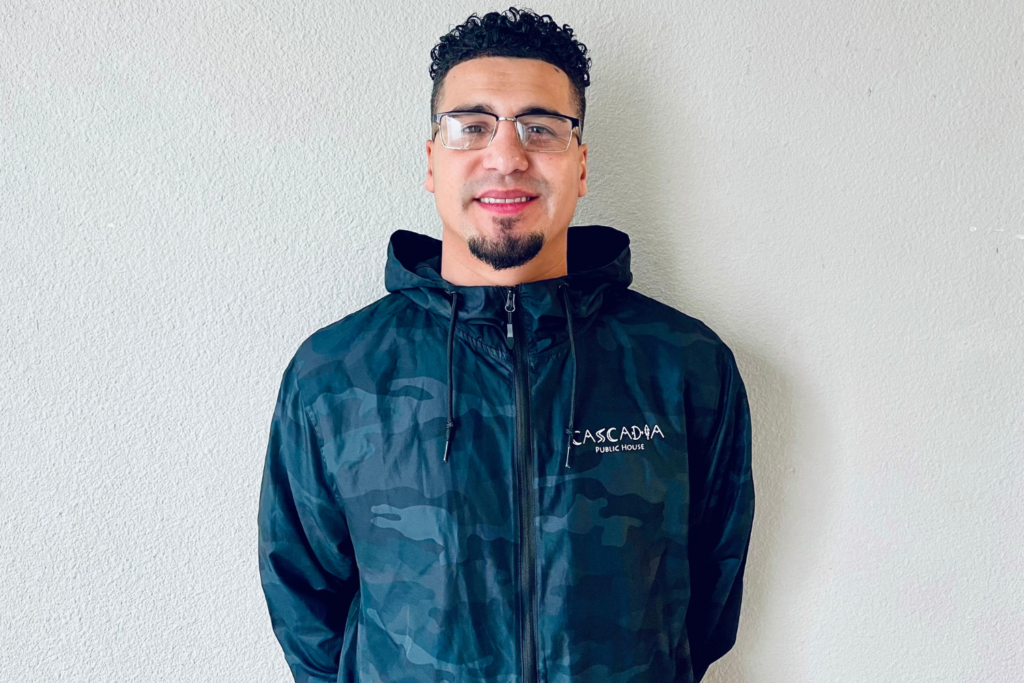
Meet Jordan Smith, co-owner of Cascadia Public House in North Spokane.
Cascadia just celebrated its 7th year in business as a welcoming, inclusive, and fun-for-everyone restaurant and pub. From burgers to salads to loaded nachos, pretzels, and lots of gluten-free and vegan options, this is the place to bring your whole family or entire friend group. We sat down with Jordan Smith to tell us all about his journey in restaurants, how Cascadia came to be, and some seriously entertaining stories along the way.
Learn more about Jordan and Cascadia Public House in this week’s Small Business Spotlight Q&A!
This interview has been edited for length and clarity.
Have you always worked in restaurants?
I’ve kind of always been in the restaurant industry. I started as a dishwasher at Golden Corral when I was 16, and I would not recommend that dishwashing job to anybody. There are, like, six, seven, eight plates a person, and then at the end of the night you get all the pans, but I was working with a high school friend, so we had some fun.
After that, I went to Pizza Hut and I was a delivery driver, and I liked that job. That was pretty cool. At the time I was in high school, I had subwoofers in my car, and I was driving around these neighborhoods looking for the right house, just beating down the block. And I couldn’t see, like, I just got glasses recently, but I haven’t been able to see very well at night for a very long time, and so my grandpa got me a spotlight to see the address on the curves when I was looking for the right house.
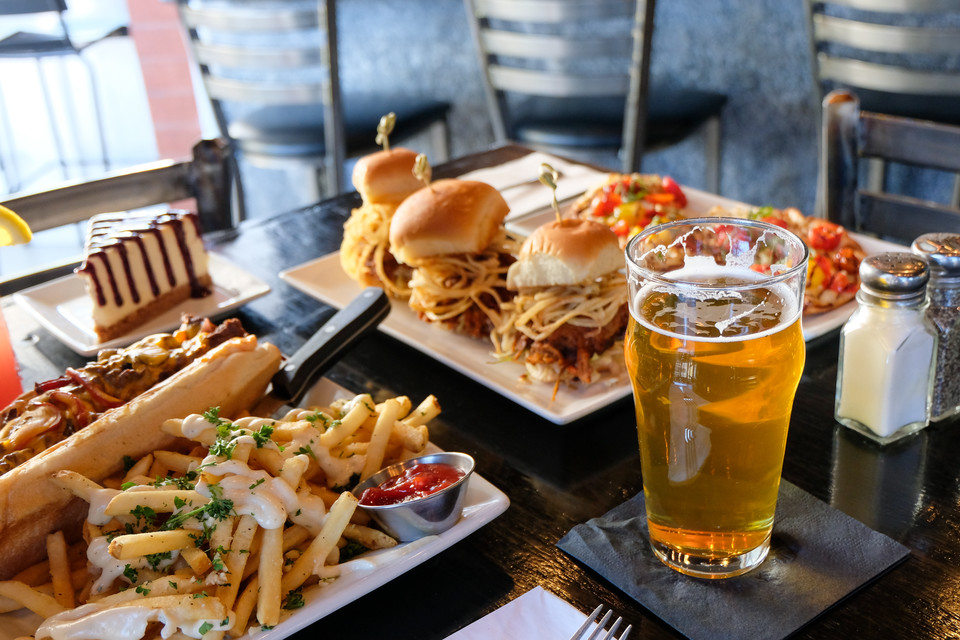
Photo Credit: Cascadia Facebook
Who has inspired you in the restaurant industry?
After Pizza Hut I was a busboy at Red Robin, and that’s where I learned a lot about the restaurant industry. I had a GM there named Chris Eldred, and he was a military guy, but he ran a tight ship and had high expectations, but he was also very personable, and made it a point to connect with the staff. And if it’s busy and the kitchen’s behind, he’ll jump back there and start cooking. If the bar’s behind, he’ll go pour some drinks.
I’ve had a lot of different managers, but Chris really did the work, and so he had a lot of respect. But he was also in there first thing in the morning, and every ketchup needed to be front-faced, and each salt and pepper needed to be salt, pepper, salt, pepper, you know. He was very particular, and so there were systems and stuff that at the time maybe I thought were a little silly, but now looking back on it, I am that guy now. I learned a lot from Chris and kind of worked my way from bus boy for a couple years in my teen years there to server.
“Sometimes you get thrown into the fire, and you just got to figure it out.”
So how did Cascadia come to be?
Some of the guys that I’d been working with decided, hey, if we get the chance, let’s save up our money, and if something pops up, let’s try to start our own thing. So we always had ideas like, we should just do it like this, or this would be better. So getting to kind of have our own vision and create something just the way we wanted it to be was always in the back of our minds, but we weren’t quite sure how that was going to pop up.
And then this place (the building that is now Cascadia) they ended up selling, and luckily one of the guys in our group had a relationship with the guy who was selling, and we got first in line in front of a bunch of other people. He was like, “you guys are first in line, but you’ve got to decide in 24 hours.” Yeah, so we went to bed one night not knowing we were going to have a restaurant, and then literally 24 hours later we were signing papers and getting keys.
It was on Valentine’s Day, actually, so it was seven years ago on Valentine’s Day. So it was kind of crazy how fast it happened, We had some ideas, but we didn’t have a name, we didn’t have a logo or a menu necessarily, just lots of ideas. And so obviously, we just signed papers, so we needed to get this place open as soon as possible.
So, being put in a pinch a little bit and the pressure on, we were able to come up with some pretty cool stuff, and it’s worked out for the last seven years. Sometimes you get thrown into the fire, and you just got to figure it out.
I’d walk to the end of this block and just sit at the end of the curve, waiting for Bobby to walk home from school.
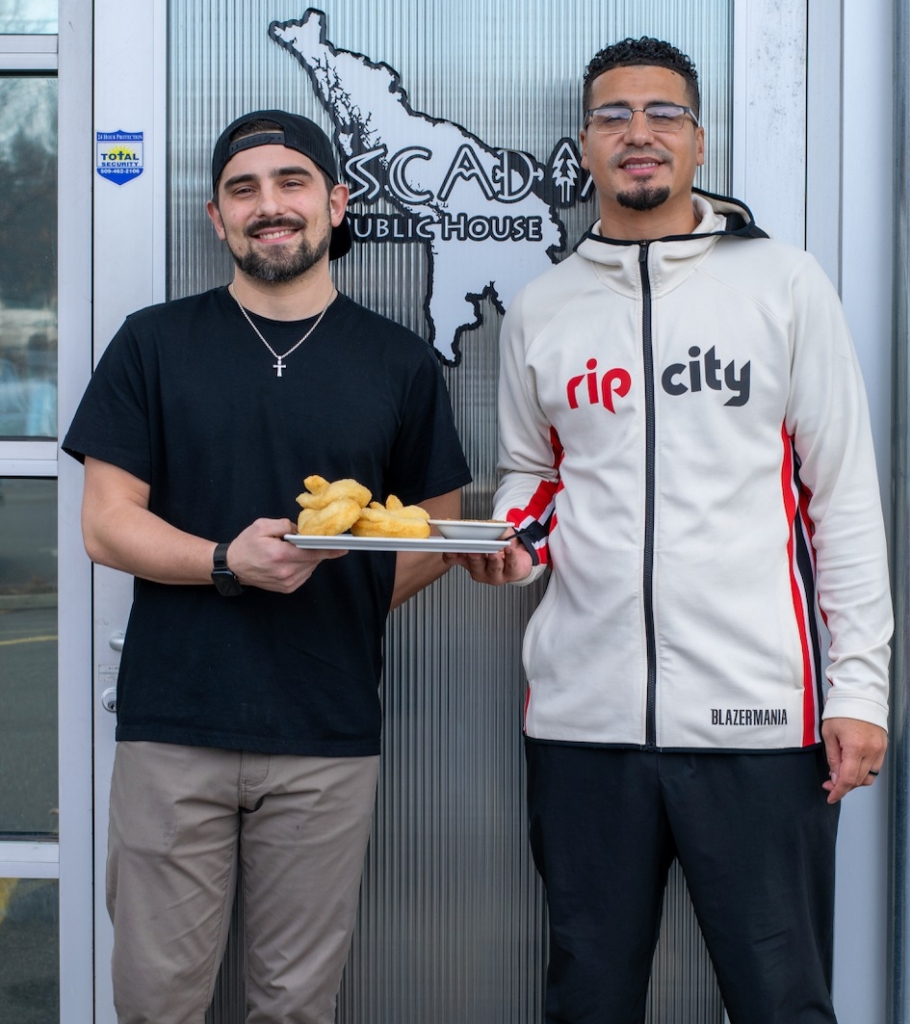
Owners Rob Hatch and Jordan Smith. Photo Credit: Cascadia Facebook
We heard your business partner is actually your childhood best friend?
We actually grew up together. He was my first friend. I met him when we had moved into this duplex, and I was really wanting to, like, buy a hamster or a gerbil for some reason. My mom was like, “if you want one, you gotta pay for it with your own money.” I didn’t have any money. So, I’m looking through boxes that we just moved. Here’s a wallet, some hats and just random stuff. And I take a little tote and I walk next door, knock on the door. “Hey, do you want to buy anything?” And they didn’t want to buy anything. I hit three houses, and they didn’t buy anything. But then, on the corner, about a half a block up, there was an older lady and a kid about my age having a picnic outside.
And so I went up to go try to sell to them. But she’s like, “hey, no, thank you, but this is Robert.” She kind of introduced us to each other. And from that day on, we was just rolling together ever since.
He was one year ahead of me. So that year, I was in kindergarten and he was in first grade. And I would get done early, at, like, noon, and he wasn’t done until three. So my mom would let me walk to this block but no farther by myself, so I’d walk to the end of this block and just, like, 2:50, just sit at the end of the curve, waiting for Bobby to walk home from school.
After high school, I think he started at Taco Time and then he went to Chili’s while I was at Red Robin. And then we both went out to J.J.’s and came back together. It just seems like it was meant to be to make this happen.
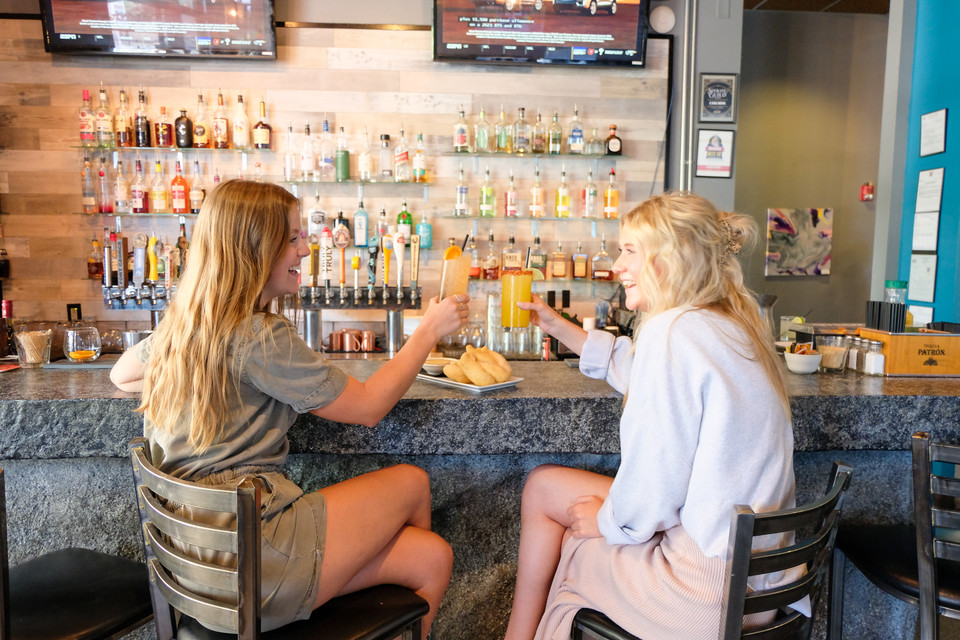
Photo Credit: Cascadia Facebook
You have a pretty inclusive menu, compared to the average pub, with lots of vegan and gluten-free options. Was that always the goal?
That’s kind of been part of our menu from the start. We were in here every day remodeling and doing all this stuff on our own. We made these tables, and we grinded down the floors, and we built the bar and everything like that. One of the partners at the time was vegan, and so we would end up at QQ a lot because they have tofu, but other than that, it was like a green salad or french fries would be his options. So we wanted to incorporate some things on our menu that are inclusive that somebody like him would like. Just because you’re vegan or dairy-free doesn’t mean you don’t still like comfort food, so we wanted to kind of incorporate bar-style vegan options for people.
You can make beet salads and have some delicious kale at the house, but we wanted to have some kind of gluttonous, flavorful dishes that will surprise the non-vegans, and that might get somebody who isn’t a vegan or plant-based to be like, “Oh, I’d try that,” and “This is actually pretty good.”
Even with our sauces, we could use a regular mayo, but we use an eggless mayo, a vegan mayo, so now pretty much like 95% of all of our sauces that all of our customers get are vegan, and they don’t know it’s vegan, but it just tastes good, so there’s some things that we were able to kind of pivot and do.
The trends are always kind of changing. The first four years, vegan was pretty heavy, and now we’re kind of like seeing vegetarian becoming like more popular, and dairy-free, gluten-free, maybe something specific, so we’ve been able to kind of mold and learn and listen to our guests, and it’s working out so far.
So it’s that rare type of place that has something for just about everybody?
I think that’s part of the reason that’s made Cascadia special, and people want to get a group together and come in here. You can get a French dip and a steak salad, and somebody can get an Impossible Burger or a tofu sandwich, and everybody can be happy and get what they like. And so that’s kind of created a nice little environment for everybody, and still feel normal, and you can still watch a game. And they still like to drink, have a glass of wine, have a cocktail. So, you gotta have both.
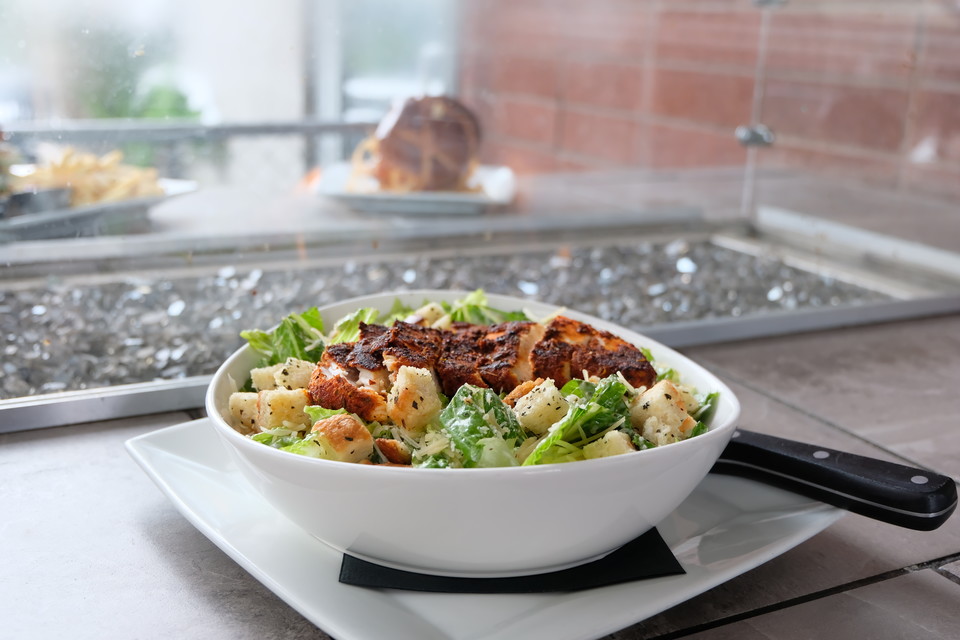
Photo Credit: Cascadia Facebook
Your Instagram is so entertaining. How do you have time for that?
So we have a social media team that we’ve been working with for the last couple years. For the first four years, I did it myself. And it’s a lot of work. And so, I just found myself kind of running out of time and not being able to do it the right way. I don’t even have an Instagram myself.
And so, they’ll send me the different still shots we’re going to do along with, you know, seven or eight different types of reels that they have ideas for. So, it’s definitely a collaboration with me and with our social media team, but they definitely do a lot of the work and they come up with some really funny stuff. And I gotta try to beg these front of the house people to come do skits with me every once a month. And it’s probably one of their least favorite things to do. And so, I’m, like, having to bribe them now to come in and end up in a lot of them myself.
We want people to feel connected to our business in more ways than one. So, not just, “I go there because I like their food.” Our staff does a really great job of connecting with people. So for social media, if we can make you laugh, and you want to like or share our stuff, I feel like we’re more connected.
We can also make fun of ourselves or make funny stuff that happens in our industry. Those are my favorite, when we do inside industry jokes a little bit that people that are in the industry really get.
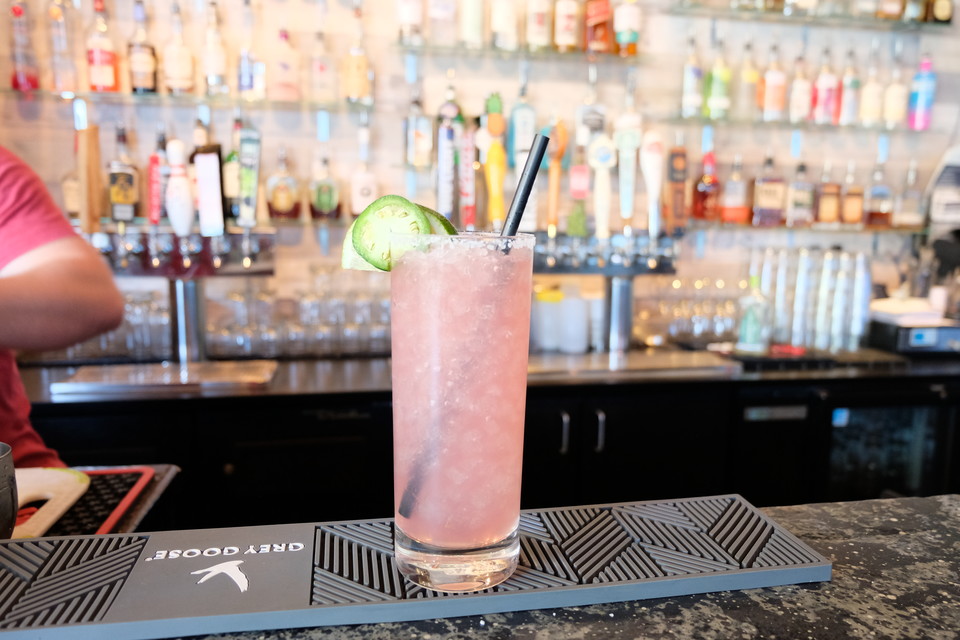
Photo Credit: Cascadia Facebook
Why is it important to you that people #SpendLikeItMatters and do you see that being important to people in Spokane?
I think Spokane does a really good job at supporting local and becoming more locally focused, because everybody knows somebody that owns a business. So everybody can kind of understand why it’s important to buy from the mom and pop instead of the big, huge conglomerate.
And I think a lot of businesses have made it important on their end to, within their business, they’re also going to also support local. We try to feature a lot of our drinks on our menu with Dry Fly, a local spirit. We try to keep our beer rotation with lots of local breweries, we use a local bakery, we’ve got local hot sauce, and we use lots of great small local farms in the summertime when they’re rolling.
So if you support our small business, that money goes to paying our staff that’s going to support all these other local businesses as well. And so it kind of keeps it in the Spokane ecosystem a little bit more. That dollar you spend at Cascadia very well could be spent again at five other local places in Spokane, and it’s important to try to do our best to keep it in the loop so we can all be as successful as we can.
BONUS: You can get 20% off Cascadia Public House gift certificates until 2/29! Head to our Black History Month marketplace and use discount code “BHM2024” to get 20% off at checkout.

1 response to “Business Spotlight: Cascadia Public House”